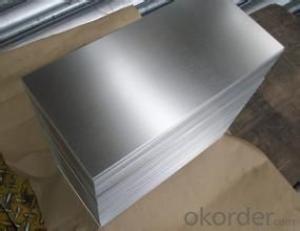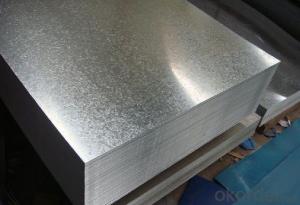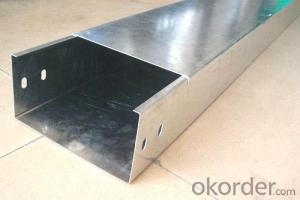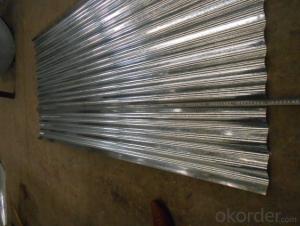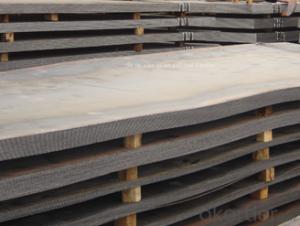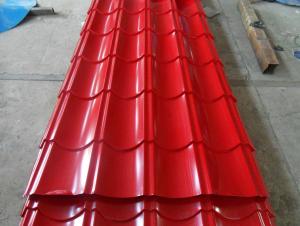GI steel sheet
- Loading Port:
- China Main Port
- Payment Terms:
- TT OR LC
- Min Order Qty:
- -
- Supply Capability:
- -
OKorder Service Pledge
Quality Product, Order Online Tracking, Timely Delivery
OKorder Financial Service
Credit Rating, Credit Services, Credit Purchasing
You Might Also Like
Specifications
GI Steel Sheet
thickness:0.135-1.5mm
width:600-1250mm
material:Q195, Q235, Q345B, SGCC, DX51D
ISO
- Q:What are the most common thicknesses of steel sheets?
- The most common thicknesses of steel sheets vary depending on the intended application and industry standards. However, some commonly used thicknesses include 0.035 inches (20 gauge), 0.0478 inches (18 gauge), 0.0598 inches (16 gauge), 0.0747 inches (14 gauge), and 0.1046 inches (10 gauge). These thicknesses are frequently used in construction, automotive, manufacturing, and other industries. Additionally, thinner gauges such as 0.0239 inches (24 gauge) and 0.0299 inches (22 gauge) may be used for lighter applications or where weight reduction is a priority. Ultimately, the specific thickness of steel sheets chosen will depend on the specific requirements of the project and the structural integrity needed.
- Q:Can steel sheets be used in food processing industries?
- Yes, steel sheets can be used in food processing industries. Stainless steel, in particular, is commonly utilized due to its corrosion resistance, durability, and ease of cleaning, making it suitable for various applications such as food storage, preparation surfaces, and equipment. Its non-reactive nature also ensures that it does not impart any undesirable flavors or contaminate the food being processed.
- Q:Are steel sheets suitable for magnetic shielding applications?
- Yes, steel sheets are suitable for magnetic shielding applications.
- Q:What kind of material does ordinary steel plate refer to in steel market?
- Wear resistance and special electromagnetic properties, carbon steel in this respect is relatively poor, because in the manufacture of this kind of steel plate, often to maintain good toughness, so we reduced the iron element to join. Not as a result of the steel sheet in abrasion resistance and special electromagnetic aspects is very weak, but the alloy plate is different because adding other alloying elements, which makes the original in iron deficiency situation has been greatly improved this is better for some special requirements of customers.
- Q:How do steel sheets compare to aluminum sheets in terms of strength?
- Steel sheets are generally stronger than aluminum sheets. Steel is known for its high tensile strength, which means it can withstand greater forces before deforming or breaking. On the other hand, aluminum sheets have lower tensile strength and are more prone to bending or warping under heavy loads. However, it is important to note that aluminum sheets can still be strong enough for many applications, especially when considering their lower density compared to steel. Additionally, aluminum sheets have the advantage of being more lightweight, corrosion-resistant, and having better thermal conductivity than steel sheets. Therefore, the choice between steel and aluminum sheets depends on the specific requirements of the project, considering factors such as strength, weight, corrosion resistance, and thermal properties.
- Q:Can steel sheets be used for manufacturing industrial equipment?
- Yes, steel sheets can indeed be used for manufacturing industrial equipment. Steel is a versatile and widely-used material in various industries due to its strength, durability, and resistance to corrosion. Steel sheets can be easily molded, cut, and shaped into various components used in the manufacturing of industrial equipment such as machinery, tools, storage tanks, conveyors, and structural supports. Steel sheets also offer excellent load-bearing capacity, making them suitable for heavy-duty applications in industries like construction, automotive, aerospace, energy, and manufacturing. Additionally, steel sheets can be coated or treated to enhance their properties, such as improving resistance to heat, chemicals, or wear. Overall, steel sheets are a popular choice for manufacturing industrial equipment due to their strength, versatility, and reliability.
- Q:Can steel sheets be used for heat transfer applications?
- Indeed, heat transfer applications can make use of steel sheets. Steel possesses excellent heat conductivity, enabling the efficient transfer of heat between surfaces. In numerous heat transfer applications, such as heat exchangers, HVAC systems, and industrial machinery, steel sheets are frequently employed. Their remarkable thermal conductivity and resilience establish them as ideal for heat transfer across a diverse array of industries and applications. Moreover, steel sheets can be readily fabricated and shaped into various dimensions, allowing for tailored heat transfer solutions.
- Q:How do steel sheets compare to galvanized sheets?
- Steel sheets and galvanized sheets are both widely used in various industries and applications, but there are some key differences between the two that make them suitable for different purposes. Steel sheets are made from a low carbon steel that is strong and durable. They can be used in a wide range of applications, including construction, automotive manufacturing, and fabrication. Steel sheets are available in different grades and thicknesses, allowing for versatility in their use. They offer excellent strength and are resistant to corrosion when properly maintained. On the other hand, galvanized sheets are steel sheets that have been coated with a layer of zinc through a process called galvanization. This coating provides a protective barrier against corrosion and extends the lifespan of the sheet. Galvanized sheets are commonly used in outdoor applications where exposure to moisture and harsh weather conditions is a concern, such as roofing, fencing, and outdoor signage. Compared to steel sheets, galvanized sheets have a higher resistance to corrosion and tend to last longer in outdoor environments. However, they may not be as strong as steel sheets and can be more expensive due to the galvanization process. Galvanized sheets also have a characteristic shiny appearance due to the zinc coating, which can give a more aesthetically pleasing finish. In summary, steel sheets are strong, versatile, and suitable for various applications, while galvanized sheets offer superior corrosion resistance and are ideal for outdoor use. The choice between the two ultimately depends on the specific requirements of the project, taking into account factors such as strength, durability, corrosion resistance, and budget.
- Q:Can steel sheets be used for shipbuilding?
- Yes, steel sheets can be used for shipbuilding. Steel is a popular material choice for shipbuilding due to its strength, durability, and ability to withstand harsh marine environments. Steel sheets are commonly used to construct the hull, decks, and various structural components of ships.
- Q:What are the dimensions of the steel sheets?
- Depending on specific requirements or intended use, the dimensions of the steel sheets may differ. Standard sizes for steel sheets are often found in dimensions like 4 feet by 8 feet or 1 meter by 2 meters. Nonetheless, customizing the dimensions of the sheets is also possible to cater to project needs. To ensure the steel sheets meet the required specifications, it is crucial to specify the desired length, width, and thickness when placing an order.
1. Manufacturer Overview |
|
|---|---|
| Location | |
| Year Established | |
| Annual Output Value | |
| Main Markets | |
| Company Certifications | |
2. Manufacturer Certificates |
|
|---|---|
| a) Certification Name | |
| Range | |
| Reference | |
| Validity Period | |
3. Manufacturer Capability |
|
|---|---|
| a)Trade Capacity | |
| Nearest Port | |
| Export Percentage | |
| No.of Employees in Trade Department | |
| Language Spoken: | |
| b)Factory Information | |
| Factory Size: | |
| No. of Production Lines | |
| Contract Manufacturing | |
| Product Price Range | |
Send your message to us
GI steel sheet
- Loading Port:
- China Main Port
- Payment Terms:
- TT OR LC
- Min Order Qty:
- -
- Supply Capability:
- -
OKorder Service Pledge
Quality Product, Order Online Tracking, Timely Delivery
OKorder Financial Service
Credit Rating, Credit Services, Credit Purchasing
Similar products
New products
Hot products
Related keywords
